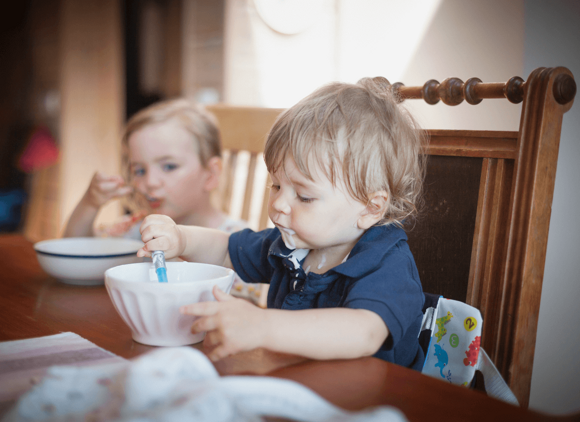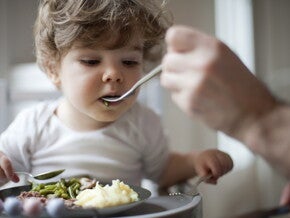
Eating Together: 5 Benefits for Your Kids
Picture this: a cozy dining space, filled with the aroma of nourishing dishes. As you sit down to enjoy a meal with loved ones, you're not just having dinner; you're fostering a deeper connection with your growing baby. Eating together can positively impact pregnancy outcomes and the development of the infant, contributing to healthier moms and babies.
The benefits extend beyond mere nutrition. Engaging in shared meals provides an opportunity to bond with your partner, family, or friends, creating a support network that's invaluable during motherhood. It's a time to swap stories, share laughter, and even discuss the impending joys and challenges of parenthood.
So, whether you're savoring a home-cooked meal or relishing a favorite restaurant dish, remember that every bite is a moment of shared joy and nourishment. It is the moment when the simple act of eating together becomes a celebration.
Importance of Eating Together
As your little one joins the dinner table, the act of communal eating becomes a cornerstone in nurturing a strong parent-child bond. Sharing meals with your baby is not just about introducing them to the world of solid foods; it's a delightful journey of exploration and connection.
Research shows that infants and toddlers who eat with their families tend to have a more diverse and nutritious diet. Beyond the nutritional aspect, the dinner table transforms into a classroom where your baby learns about flavors, textures, and social interactions.
Moreover, the shared experience of meals lays the foundation for healthy eating habits. When your baby witnesses you enjoying a variety of foods, they're more likely to embrace a diverse palate themselves. It's an opportunity to instil a positive relationship with food, fostering a lifelong appreciation for healthy choices.
But perhaps most importantly, these shared meals create a sense of togetherness and security. As you share smiles, giggles, and the occasional food flinging, you're building a treasure trove of memories that will last a lifetime.

5 Benefits of Eating Together
Now it’s time to talk about each one of those benefits that make eating together something important for your child and your family:
1. Encourages Good Eating Habits
The family dinner table serves as a powerful classroom for instilling lifelong healthy eating habits. When children witness their parents making nutritious food choices, it sets a precedent for their dietary preferences.
By creating a positive association with wholesome foods and diverse flavors, family meals become a platform for shaping a well-rounded approach to nutrition. Regular exposure to a variety of foods during shared meals also expands a child's palate, reducing the likelihood of picky eating habits.
2. Prevents Psychosocial Problems
Beyond the nutritional aspect, the practice of gathering for family meals acts as a protective shield against psychosocial problems in children. The shared environment at the dinner table promotes open communication and emotional expression.
Children who regularly engage in family meals often develop stronger bonds with their parents, creating a support system. This connection contributes significantly to a child's emotional resilience, reducing the risk of psychosocial issues.
3. Helps to Achieve a Healthy Weight
The family dining experience plays a pivotal role in helping both children and adults maintain a healthy weight. Families who dine together are more likely to consume balanced, home-cooked meals, minimizing the reliance on processed and calorie-laden snacks.
The structure of a shared mealtime also establishes a routine that promotes mindful eating and proper portion control, contributing to weight management and overall well-being.
4. Improves your Children's Self-Esteem
The emotional impact of shared meals on a child's self-esteem cannot be overstated. The sense of belonging and acceptance cultivated during family dinners creates a secure space where children feel valued.
Regular family meals provide an opportunity for positive reinforcement, affirming a child's worth and fostering a healthy self-image. This boost in self-esteem is a powerful foundation that empowers children to navigate situations later in life.
5. Improves Communication Skills
The dinner table serves as a dynamic arena for honing communication skills in children. Engaging in conversations during meals encourages the development of verbal expression, active listening, and the art of meaningful dialogue.
Children learn to articulate their thoughts, share experiences, and empathize with others, contributing to the development of effective communication skills crucial for success in personal and professional relationships.

Tips for Eating Together as a Family
Embarking on the journey of shared family meals is a heartwarming endeavor that goes beyond the act of eating together. It's about fostering connections, creating lasting memories, and nurturing a sense of togetherness. To help you with this, we've compiled a set of practical tips designed to enhance your family meal experience.
- Set regular mealtimes to create a predictable schedule for family meals. Consistency fosters a sense of structure and makes it easier for everyone to plan and participate.
- Designate a comfortable and inviting space for meals. Minimize distractions by turning off electronic devices and creating an atmosphere conducive to conversation and connection.
- Make mealtime an adventure by trying new recipes as a family. This not only adds variety to your meals but also provides an opportunity for culinary exploration and shared creativity.
- Make family meals memorable by celebrating special occasions together. Whether it's a birthday, an achievement, or simply the end of a busy week.
- Explore different cuisines and celebrate the diversity of your family's cultural backgrounds. Introducing a variety of flavors can make mealtime more exciting and educational, fostering an appreciation for different cultures.
- Distribute responsibilities such as setting the table, serving food, and cleaning up among family members. This not only lightens the load for one person but also reinforces the idea that mealtime is a collaborative effort.
Family meals are the threads that weave the fabric of strong bonds, fostering a sense of belonging, support, and joy within the home.
From the early stages of pregnancy, where the dinner table becomes a celebration of life, to the shared experiences that shape a child's self-esteem, the benefits are diverse and far-reaching. The dinner table transforms into a sanctuary where good eating habits are cultivated, psychosocial well-being is safeguarded, and communication skills are honed.
As we've explored various facets, one thing remains clear: the dinner table is more than a place to eat; it's a space where love, laughter, and learning unfold.

Gain a better understanding of your child's development with the help of our stages




































